The Elves of Frost and Flame : The Settlers of Iceland
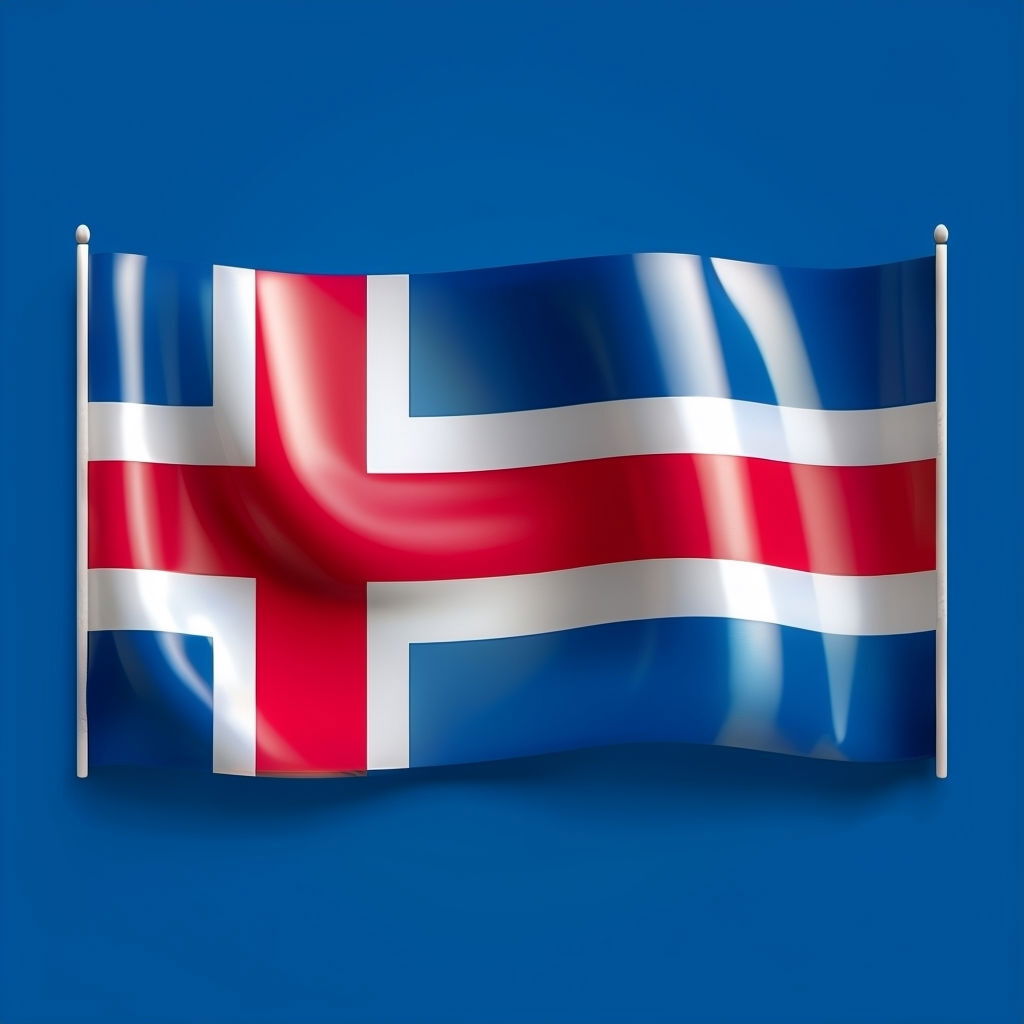
Prologue:
The sea roared like a beast beneath the hull of the longship, its dark waves thrashing against the wood with a fury that seemed almost alive. Salt spray bit at the faces of the crew as they strained at their oars, eyes fixed on the shadowed horizon. Clouds hung low, smothering the last light of day, and the wind howled as if echoing the wails of forgotten spirits.
Kaupmann Bjarnisson stood at the prow, his hand gripping the carved serpent’s head that led their vessel. Beneath his fingers, the wood felt cold and slick, but he held firm, his gaze locked on the distant shore. Somewhere in that shroud of mist and shadow lay their new home—land promised by the gods and earned through blood. His father’s voice, like the murmur of ancient waters, whispered through his thoughts: *There is no going back now, my son.*
He glanced at the faces of his kin, hard and weathered by the sea, and saw the same look in their eyes—hunger, fear, and a glimmer of hope that had not yet been snuffed out by the storm. Behind them, they had left Norway’s fjords and its long shadows. Ahead, Iceland waited, a land of fire and ice, where mountains scraped the sky and valleys whispered of secrets long buried.
The land had called to him in dreams, its voice ancient and clear. It promised freedom, but it spoke of dangers, too—forces that slept beneath the mountains, unseen eyes that watched from the hills. The seeress in his village had warned him: “Iceland is no empty land. It has rulers of its own, and they will not welcome men lightly.”
Kaupmann had scoffed then, his pride and courage like shields against her words. But now, as the wind keened and the ship bucked beneath him, he felt the weight of those words, like stones sinking into his heart.
“Land!” came the cry from the bow. The crew turned as one, eyes straining through the mist. There, emerging from the veil of fog, were the jagged outlines of cliffs, the white crests of waves breaking against the shore. A chill ran through Kaupmann’s bones, deeper than the cold of the sea. The cliffs loomed like the teeth of a beast waiting to devour them.
As they drew nearer, the mist parted just enough for Kaupmann to see the valleys beyond—lush and green despite the snow-capped peaks that towered above. But it was not the beauty that held his gaze. In the shadows of the cliffs, a flicker of light caught his eye, quick and fleeting like the dance of a flame. He squinted, but the light was gone, as if it had never been.
He knew then that the land was watching. The whispers of the wind carried words he could not understand, but their intent was clear: *You are not alone here.*
The longship scraped against the shore, and the crew leapt into the surf, dragging it onto the black sands. Kaupmann stepped onto the new land, his boots sinking into the damp earth. He felt the pull of the soil, the weight of a place where old magic lay thick and unspoken. He took a breath, the air sharp with salt and something else—something ancient.
“Here, we make our home,” he called to his people. “Here, we stand or we fall.”
But even as he spoke the words, he felt the eyes of the land upon him, the shadows of the mountains pressing close. Iceland, vast and beautiful, waited with its secrets—secrets that would not stay buried for long.
And in the distance, beneath the hills, the elves stirred.
--
A Short Story
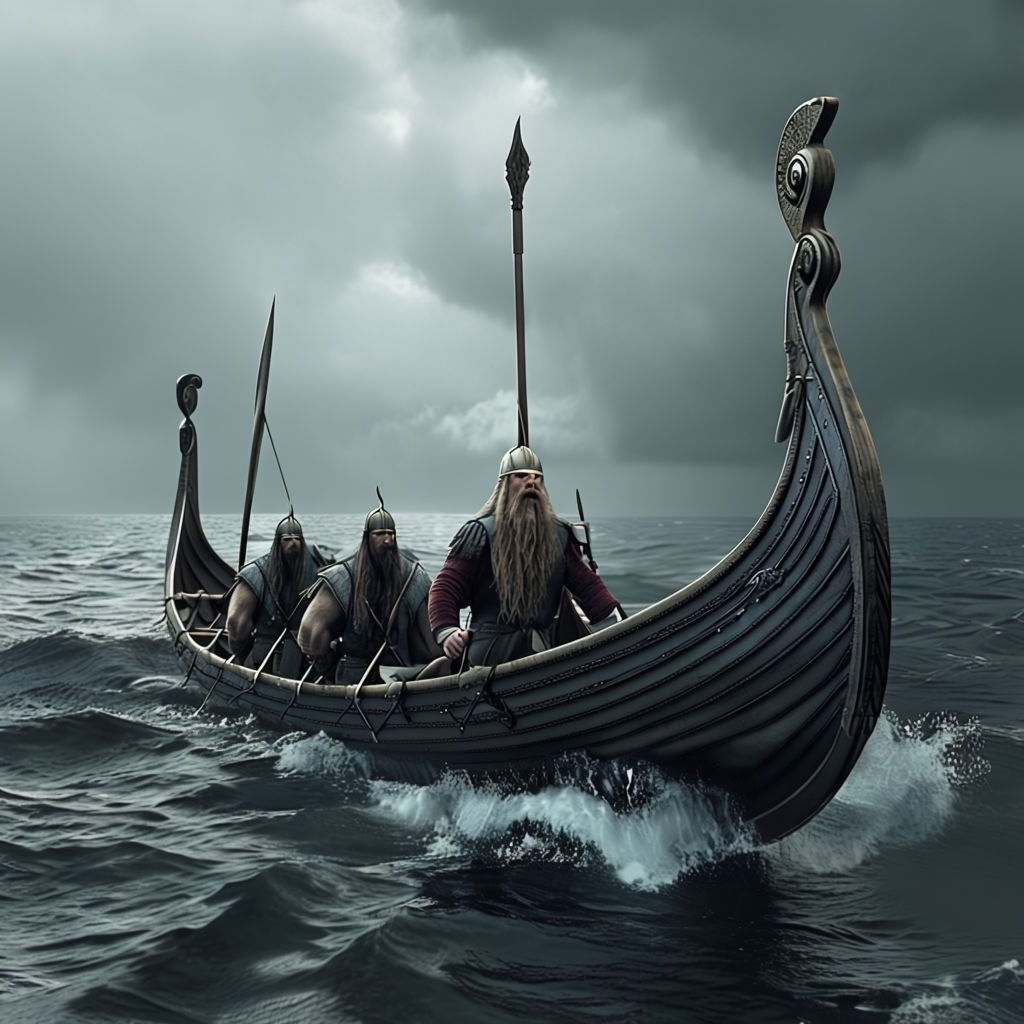
The wind whispered through the valley, tugging at Kaupmann Bjarnisson’s cloak as he stepped beyond the boundaries of the settlement. The wooden hall and newly built longhouses stood huddled together behind him, their smoke rising like thin tendrils into the gray sky. His people were busy with the work of survival—tending to livestock, mending roofs, and gathering driftwood—but Kaupmann’s thoughts had drifted far from the daily chores.
The visions had returned last night. As the embers of the hearth dimmed, his dreams were filled with the shapes of mountains shifting and opening, revealing a golden light that flickered like fire. Faces, indistinct and elusive, appeared in the corners of his vision—eyes that watched from beneath the earth. The land, as the seeress had warned, was speaking to him.
He tightened his grip on the axe at his belt. Today, he would go farther than before, beyond the familiar boundaries his people had set. There were rumors among the men—rumors of valleys where the air grew too cold, where cattle refused to graze, and where a single misstep could mean disappearing forever. But Kaupmann needed to know what lay beyond. If they were to carve out a place here, he had to understand the land and the forces that shaped it.
Two of his men joined him—Sturla, a giant with a scar running down his cheek, and Hallgerd, lean and sharp-eyed like a hawk. They were the ones he trusted most. “We’ll follow the river west,” he said. “There’s a valley beyond the ridge. I want to see it.”
Hallgerd nodded, his face impassive, while Sturla grunted and hefted his spear. “Let’s hope it’s better than the last one. That place was nothing but ice and stone.”
Kaupmann forced a smile. “This land has its secrets. We just need to find the right ones.”
The trio set off, the cold air biting at their cheeks as they trekked along the river’s edge. The landscape changed as they went, the ground shifting from grassy fields to black, volcanic rock, and then to dense patches of moss that seemed to swallow their footsteps. The river, fed by the glacial melt from the mountains, glittered under the pale light, snaking its way through the earth like a silver vein.
As they climbed higher, the wind grew stronger, tugging at their cloaks and carrying with it the scent of sulfur. Kaupmann paused at the top of a ridge, his gaze sweeping over the valley below. It was vast and empty, a stretch of green surrounded by jagged cliffs. Mist hung low over the ground, swirling in the hollows like ghostly breath.
“There,” he pointed. “The valley we seek.”
Sturla squinted. “Looks like a place the gods forgot.”
Hallgerd, ever cautious, scanned the terrain. “Or a place they remember all too well.”
Kaupmann’s heart quickened. The valley called to him, the same pull he had felt since he set foot on Iceland’s shores. “Come,” he said, and the three of them descended.
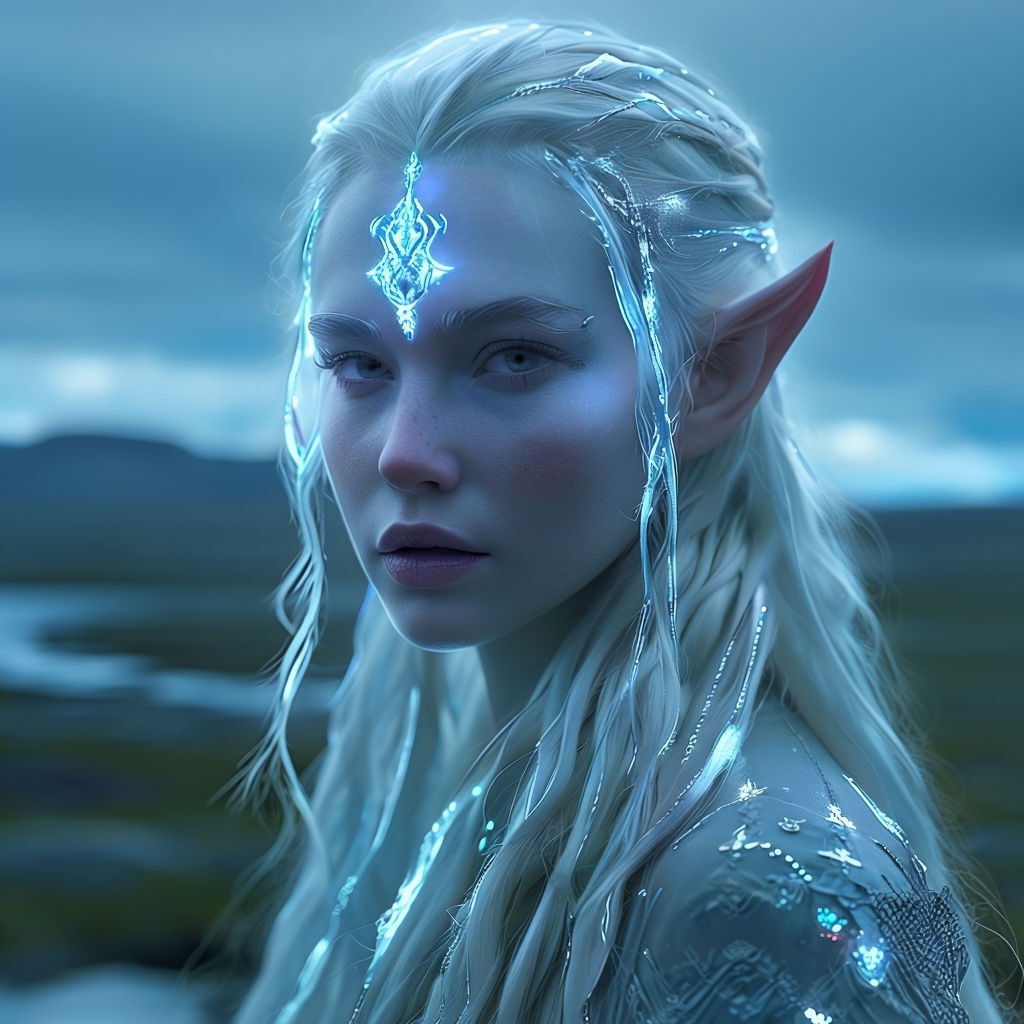
As they entered the valley, the air grew strangely still. The wind that had howled at their backs moments before now quieted, and the silence pressed down, heavy and unnatural. The mist curled around their legs, cool and damp. Ahead, the river vanished into the fog, leaving only the sound of water rushing somewhere out of sight.
Kaupmann’s steps slowed. The ground felt soft beneath his boots, and the scent of wet earth filled his nostrils. He crouched, touching the soil. “It’s warm,” he said, frowning.
Hallgerd knelt beside him, running his fingers through the moss. “Hot springs, maybe.”
But Kaupmann shook his head. It wasn’t the warmth of the springs he’d felt before. This was different—something alive, like a pulse beneath the ground.
A flash of light caught his eye. He turned, squinting through the mist. There, at the edge of the valley, the light flickered again, golden and bright. “Did you see that?” he whispered.
Sturla and Hallgerd looked, but the light was gone.
“Nothing but fog and shadows,” Sturla grumbled.
But Kaupmann knew what he had seen. He rose, gripping his axe tighter. “Stay close. There’s something here.”
They moved deeper into the valley, the mist thickening around them. The light appeared again, just a flash, like the flare of a distant torch. This time, it lingered, and Kaupmann followed, feeling the tug in his chest as if the land itself was pulling him forward. His men followed, their eyes scanning the shadows.
The valley opened into a small clearing, and there, where the mist parted, Kaupmann saw it—a circle of stones, tall and ancient, arranged in a pattern that felt both familiar and strange. The light danced between the stones, casting long shadows on the ground.
“What is this place?” Hallgerd murmured.
Sturla’s eyes narrowed. “A shrine. But not one of ours.”
Kaupmann stepped closer, feeling the heat rising from the earth. As he approached the stones, the light grew brighter, and he felt the air around him hum with energy. He reached out, fingers brushing the surface of one of the stones. It was warm to the touch, and he felt a shiver run through him, as if he had disturbed something that should have remained still.
The mist thickened, swirling faster. And then, from the corner of his eye, he saw them—figures emerging from the fog, slender and pale, their eyes glowing with a light that matched the stones.
“Huldufólk,” Hallgerd breathed, his voice barely above a whisper.
Elves. The hidden people.
Kaupmann’s heart raced. The figures stood at the edge of the clearing, their faces impassive and unreadable. He had heard stories of the *huldufólk*, of their power and their secrecy, but seeing them—feeling their presence—was like a dream turned real. He gripped his axe, unsure whether to bow in respect or prepare for a fight.
One of the figures stepped forward, her eyes meeting his. She was tall, her hair like spun silver, and her robes shimmered as if woven from starlight. “Kaupmann Bjarnisson,” she said, her voice soft but echoing in the stillness. “You walk in the land of the hidden.”
He swallowed, forcing himself to speak. “I mean no harm. We are settlers, seeking a place to live and thrive.”
She tilted her head, as if considering his words. “This land is not yours to claim. It belongs to us and has for generations beyond your reckoning.”
Kaupmann’s grip tightened. “We come with respect. We only wish to share the land.”
The elf woman’s eyes glinted. “Share? You seek to tame what cannot be tamed, to build where the earth’s magic flows.” She gestured to the stones. “This place is sacred, a gateway between worlds. Disturb it, and you disturb the balance.”
Kaupmann felt the weight of her words. He had seen the beauty of this land, its power, but he had also felt the pull to make it his own. “What must we do?” he asked. “How do we live here without offending your kind?”
The elf’s expression softened, but only a little. “There are old laws. If you wish to survive, you must learn them. You must honor the places where we dwell, and you must respect the signs we give.”
A chill ran down Kaupmann’s spine. “And if we do not?”
The elf woman’s gaze darkened. “Then your people will know the wrath of the land. The earth will rise against you, the rivers will run dry, and the mountains will close their paths.”
Kaupmann nodded, the weight of the pact settling on his shoulders. “I will honor your laws.”
The elf woman smiled, a sad, knowing smile. “We shall see.” And with that, she turned, the other figures melting back into the mist. The light faded, leaving only the stones and the silence.
Kaupmann stood there for a moment, the reality of their presence sinking in. He had sought the land’s secrets, and now he had found them—but he knew the cost of that knowledge would be high.
Sturla and Hallgerd exchanged uneasy glances. “What do we do now?” Hallgerd asked.
“We remember,” Kaupmann said. “And we respect the hidden paths.”
As they made their way back to the settlement, the mist slowly lifted, revealing the valley’s full beauty—a reminder that the land was as dangerous as it was alluring. And somewhere, beneath the earth, the elves watched, waiting to see if the promise made in the shadows would hold.
--
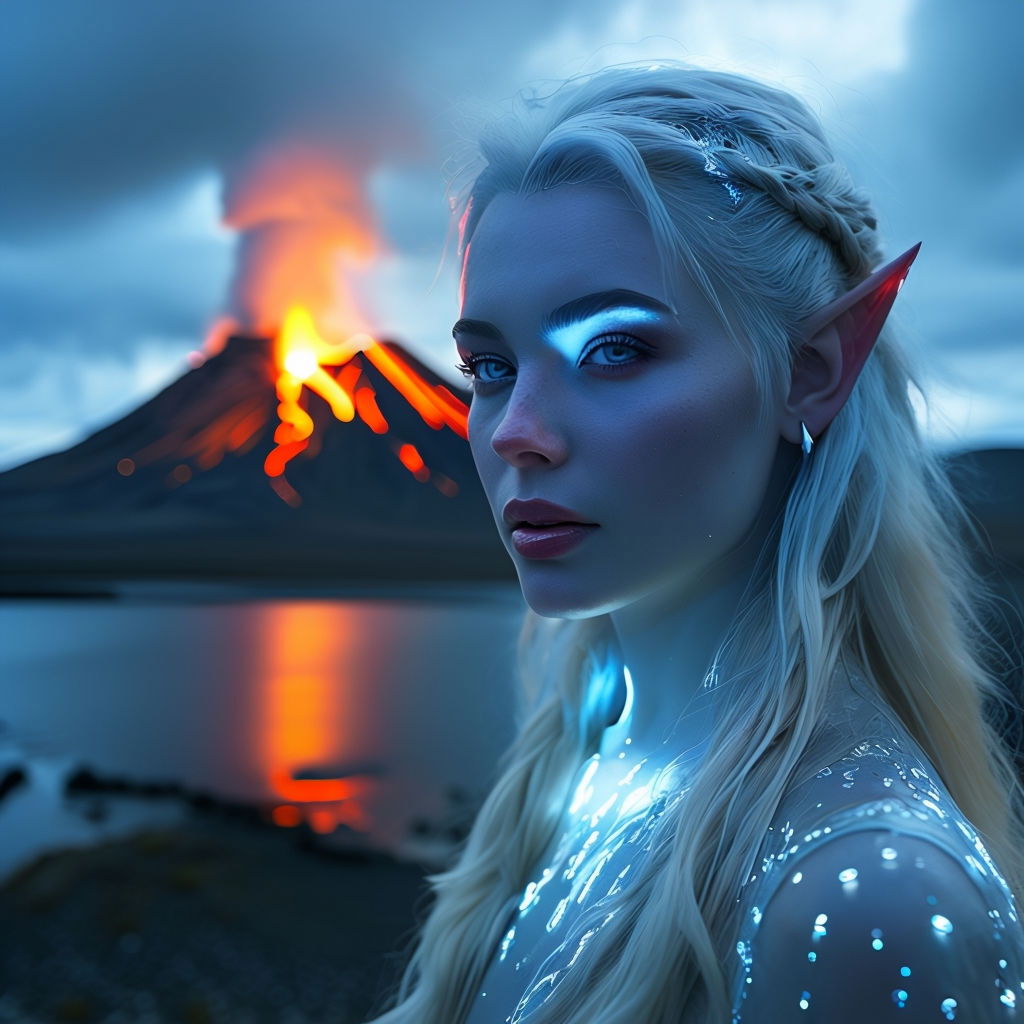
The settlement's expansion was cautious at first. Kaupmann’s encounter with the elves weighed heavily on his mind, but the need for survival outweighed any fear of the unseen. The winter was fast approaching, and the settlement needed food, wood, and shelter if they were to make it through the long, dark months ahead. The cold gnawed at their bones, and every passing day reminded them that Iceland was as unforgiving as it was beautiful.
Kaupmann had shared the elf woman’s warning with his closest men, urging caution and respect for the land. Sturla and Hallgerd remained wary, but others were less convinced. “The gods favor the bold, not the fearful,” one man grumbled. “We cannot let stories of elves hold us back.”
Kaupmann could not argue with that sentiment entirely. After all, they had come to Iceland for freedom and opportunity, not to be cowed by shadows and whispers. But he insisted on certain measures: no trees were to be felled near stone circles, no digging around the hot springs, and no one was to venture alone into the mist-covered valleys where the hidden people were known to dwell. Most agreed—some reluctantly, others with open defiance.
As the days passed, they began to push deeper into the valleys and hills, cutting timber and clearing land for fields. They built barns and longhouses, dug trenches for irrigation, and set traps for game. Kaupmann watched as their settlement grew stronger, his pride mixing with a gnawing sense of unease. The valley, for all its beauty, felt different now. There were nights when he would wake to the sound of whispers in the wind, voices speaking in a language he did not understand.
One afternoon, as the men returned with a load of freshly cut timber, a shout rang out from the edge of the settlement. Kaupmann rushed to the source of the commotion and found one of his hunters, a young man named Einar, stumbling into the village. His face was pale, his eyes wide with terror.
“What happened?” Kaupmann demanded, gripping Einar’s shoulders.
Einar’s breath came in ragged gasps. “The woods—something was watching me. I felt eyes on me, but when I turned, there was nothing. I took a shot at a deer, but—” He paused, swallowing. “When I went to find it, it was gone, and the trees—they moved. I swear, chieftain, the trees moved.”
Kaupmann’s jaw tightened. “Did you take anything from the woods?”
Einar shook his head. “No, I swear it. But the air—there was a feeling, like something unseen was angry.”
Kaupmann’s mind flashed back to the elf woman’s warning. “Gather the men,” he ordered. “We’ll offer a gift to the land. We must not anger them.”
They built a small cairn near the edge of the forest, placing offerings of food, mead, and a small carved figure of Thor as a sign of respect. Kaupmann hoped it would be enough to appease whatever had been disturbed. The men grumbled among themselves, some whispering that it was a fool’s errand. But Kaupmann knew better than to ignore the signs.
The next morning, the sun rose clear, and the men felt the tension lift. They continued their work, and for a time, it seemed that the offering had been accepted. The settlement thrived, their herds grew, and their fields promised a good harvest.
But the peace did not last.
One evening, as the sun dipped below the mountains, a thick fog rolled into the valley, faster and heavier than any they had seen before. It swallowed the land, muffling the sounds of the settlement and cloaking the world in a dense, impenetrable mist. The fires in the longhouse flickered, and the air grew cold, colder than it should have been.
Kaupmann stepped outside, feeling the chill seep into his bones. He called out to his men, but the mist swallowed his voice. Shapes moved in the fog—figures just out of sight, their forms flickering like shadows. His heart pounded, and his hand went to his axe.
Then he saw it. At the edge of the mist, where the forest met the fields, stood the elf woman. Her eyes glowed with a cold, silvery light, and her face was as impassive as stone.
“You were warned, Kaupmann Bjarnisson,” she said, her voice carrying through the fog. “The land is not yours to command.”
Kaupmann stepped forward, raising his hands in a gesture of peace. “We meant no disrespect. We offered gifts, showed honor.”
The elf woman’s expression did not change. “Yet your people take more than they give. They build and cut, dig and burn. The balance is broken.”
“We must live,” Kaupmann said, his voice tight. “We seek only to survive.”
“Survival has a price.” She raised her hand, and the fog thickened, swirling faster around the settlement. The air crackled with energy, and Kaupmann felt a shiver run through him.
“Wait!” he shouted, but it was too late. The ground beneath his feet trembled, and a chill wind swept through the valley, freezing the river’s surface in an instant. Cries rang out from the longhouses as the mist turned to frost, creeping up the walls and shattering the wooden frames.
Sturla and Hallgerd appeared beside him, weapons drawn. “What is happening?” Sturla shouted, eyes wide with fear.
“The elves,” Kaupmann whispered. “They are taking their revenge.”
The elf woman’s figure faded into the mist, her voice echoing one last warning. “Leave this place, or the land will swallow you whole.”
The ground shuddered again, and Kaupmann watched as the earth split open, fissures snaking through the fields they had worked so hard to till. The frost spread, withering the crops, and the cattle, panicked, fled into the darkness. The air was filled with the scent of sulfur, and from deep within the earth, a low rumble grew, like the growl of a beast awakening.
“We must leave!” Kaupmann shouted, rallying his people as the land convulsed beneath them. The mist swirled like a living thing, and the shapes within it seemed to laugh, their voices mocking and cruel. “Back to the boats!”
But the land had already begun its revenge. The river, once a source of life, now overflowed with ice-cold water, sweeping away the smaller structures they had built. The forest, its trees like ancient sentinels, closed in, the paths they had cleared vanishing as branches twisted and entwined.
As they gathered what they could, Kaupmann felt the weight of his failure. The elves had made their claim, and he had not heeded their warning. The land itself had turned against them, and no offering could now mend the breach.
The settlement’s people, once confident and full of hope, fled into the night, the fog swallowing their shouts and cries. Kaupmann stood at the edge of the valley one last time, watching as the mist closed over the life they had tried to build. In his heart, he knew that Iceland was not just a place of ice and fire, but a realm of power, of spirits and secrets that demanded respect—or vengeance.
With a heavy heart, he turned away, leading his people back down the path to the shore. The longships awaited, their hulls weathered and ready to take them once more into the unknown. But as they sailed away from the cursed valley, Kaupmann could not shake the feeling that the eyes of the land still watched, and that the price of their transgression had only begun to be paid.
--
Epilogue:
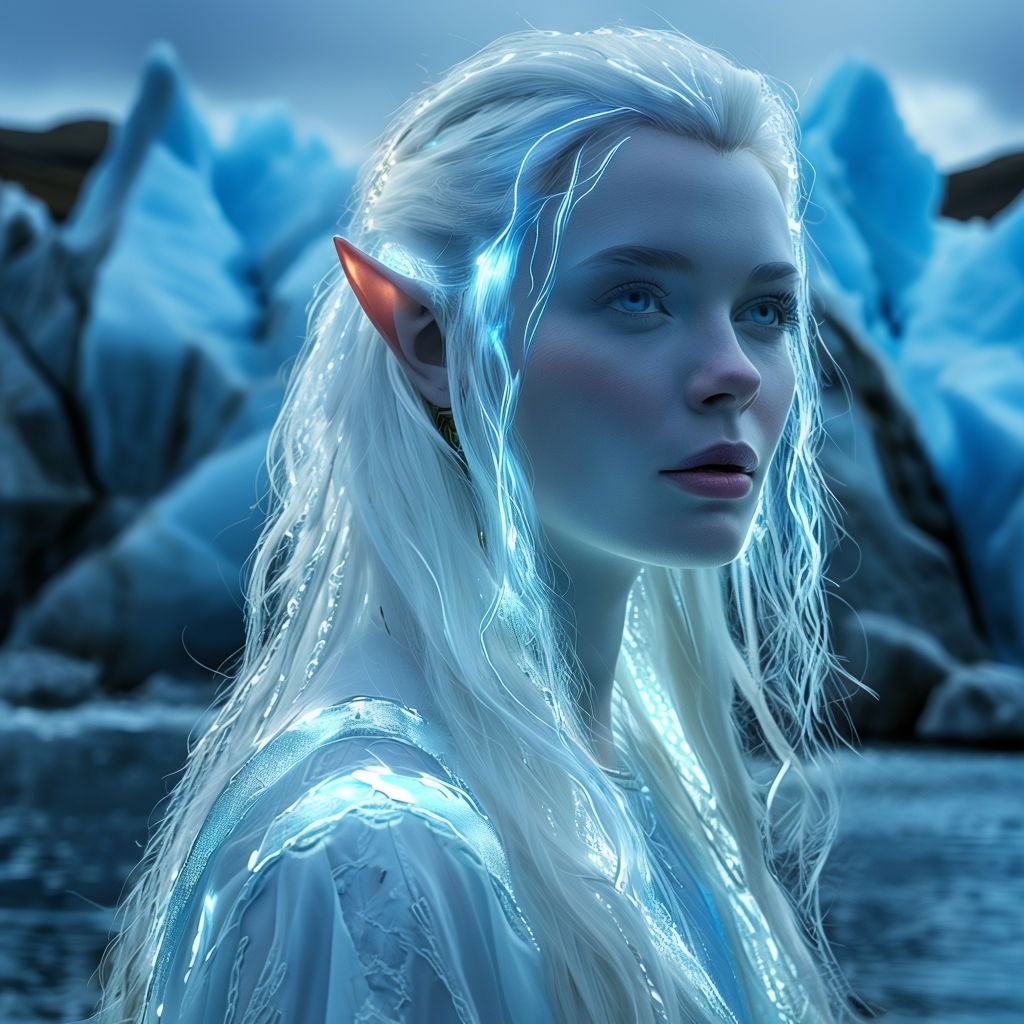
Kaupmann stood at the edge of the cliff, the wind tugging at his cloak as he stared out over the vast expanse of the sea. Below, the waves crashed against the black rocks, sending up sprays of foam. The longships, anchored in the sheltered bay, swayed gently, their dragon-headed prows looking out toward the distant horizon. Iceland lay behind him, its mountains wrapped in mist, its valleys hidden from sight.
He felt the weight of disappointment in his chest—a heaviness that had settled there since the elves had revealed their true nature. In the old stories, the elves were described as beautiful, graceful beings who lived in harmony with the land, protectors of nature and guides to those who sought to understand its secrets. They were supposed to be the guardians of peace, welcoming those who came with respect and honor.
But what he had encountered was different. The elves he had met were neither welcoming nor kind; they were fierce, territorial, and vengeful, quick to strike and punish. They seemed less interested in harmony and more in keeping their power secure, ruling the hidden places of the land with an iron grip. They had made themselves judges of who could stay and who must leave, their beauty hiding a cold and calculating nature.
Kaupmann clenched his jaw. *Was it too much to hope that the old tales were true?* That in this new land, one could find something different—a place where man and spirit could work together, where settlers could share in the magic and bounty of the land without fear? He had come to Iceland seeking freedom, a chance for his people to thrive, and he had hoped that the hidden folk would see them as partners rather than intruders.
He sighed, the sound carried off by the wind. Perhaps it was the way of all things in this world—every creature, human or elf, clinging to its territory, its power. Perhaps even the most beautiful beings, those who claimed to live closest to nature’s heart, were no different from the chieftains and warriors he had left behind in Norway.
But despite the elves' hostility, a part of him could not help but feel sadness for the path they had chosen. Iceland was a land of untamed beauty, where the elements danced in fierce harmony—fire and ice, light and darkness. It could have been a place where different worlds met, where the old and the new intertwined to create something greater than either alone.
Instead, the elves had turned away, guarding their hidden kingdom and keeping their secrets locked away beneath the earth.
In their fear of the new, they had become like the worst of men—grasping, suspicious, and cold.
Kaupmann’s eyes lingered on the distant shore, shrouded in mist. “May they find peace,” he whispered, though he felt little hope in his words. “And may we find a home somewhere the spirits are not so unforgiving.”
With that, he turned his back to the island, the wind at his back, as he descended the path to the ships. They would sail again, searching for another shore, another place where they might be welcomed. But as he looked once more at Iceland’s rugged beauty, he could not help but mourn what might have been—a chance for harmony, lost to the shadows of suspicion and fear.
As the longships set sail, the land faded into the distance, and the memory of the elves—beautiful but bitter—lingered in Kaupmann’s heart. Perhaps there were places where man and spirit could find peace together, but he knew now that Iceland, for all its majesty, was not such a place.
--
This story takes place in the 9th century, during the early Norse settlement of Iceland. As historical fantasy fiction, it blends real historical events—the migration of Norse chieftains and their struggle to establish settlements in a harsh new land—with elements of Norse mythology and Icelandic folklore. The story introduces supernatural beings like elves and trolls, who interact with the settlers, influencing their fate and revealing the mystical forces that shape Iceland’s rugged landscape. A Viking story. It follows Norse settlers, often referred to as Vikings, during the 9th century as they venture to Iceland seeking freedom and new lands. The story explores the challenges they face, including survival in a harsh environment and encounters with supernatural beings, all while embodying the Viking spirit of exploration, courage, and resilience. The inclusion of Norse mythology and the cultural values of honor and strength further aligns it with the Viking tradition.